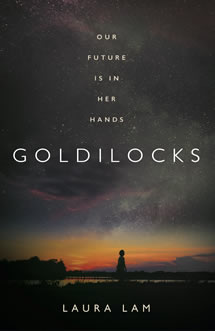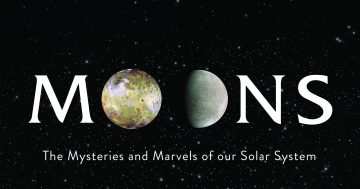Reviewed by Robert Goodman.
By Laura Lam, Hachette, $32.99.
 Laura Lam’s new book Goldilocks definitely has some fairytale buried at its core, but is for the most part a science fiction thriller. It opens 30 years after its main events with a framing involving a woman called Naomi Lovelace prepared to tell her story. That story draws on some classic science fiction tropes – a dying Earth, a new world in the offing, the dream of faster than light travel – but adds a few extra twists along the way.
Laura Lam’s new book Goldilocks definitely has some fairytale buried at its core, but is for the most part a science fiction thriller. It opens 30 years after its main events with a framing involving a woman called Naomi Lovelace prepared to tell her story. That story draws on some classic science fiction tropes – a dying Earth, a new world in the offing, the dream of faster than light travel – but adds a few extra twists along the way.
Naomi Lovelace is one of a group of five women who steal a spacecraft. This is not just any spacecraft. The Atalanta has been designed to use new technology to send the first humans to a new, earth like planet that has been named Cavendish. Cavendish exists in the “goldilocks zone” of its solar system, a term used by scientists to classify Earth-like planets (not too hot and not too cold). The have to steal the ship as the program was not designed for them. Political changes have seen women forced out of most professions or sidelined for male counterparts. But Naomi’s adopted mother Valerie Black, CEO of the company that built the Atalanta has other ideas and has the resources to finance the audacious heist of the craft by herself, Naomi and three others. Their route – fly to Mars, test the faster-than-light technology on a short hop, fly back to Mars and head for Cavendish. Valerie’s idea is that by establishing the beachhead on the new planet the women can set some terms for its eventual settlement.
Suffice to say, without trying to spoil anything, things do not go to plan. Technical problems require the crew to dig deep to keep the craft flying, including making major sacrifices. Then there are schemes within schemes which, when revealed, put more pressure on the dynamic aboard the Atalanta. Due the techo-fixes and backstory it takes a while for the plot to take shape but when the tension ramps up, it stays up.
The heart of Goldilocks is philosophical – in a time when the Earth is less able to support humans, what choices we might make to continue. The “trolley problem”, brought to life so vividly in The Good Place, gets a good workout here. But there is also that fairytale element – the adopted child, the controlling stepmother, poisons and cures. On top of all that, there is also a pandemic thread which makes for slightly uncomfortable reading at this particular time in World history. All of which leaves all of the characters except Naomi (who gets a number of backstory chapters) a little under-served.
Which is all to say that Lam packs a lot into a lean, engaging package. Social commentary, philosophy, the wonder and challenges of space travel, a little optimism and some human drama. Overall Goldilocks is the type of thoughtful, humanist science fiction, that we need more of.
This and 500 more reviews can be found at www.pilebythebed.com.





